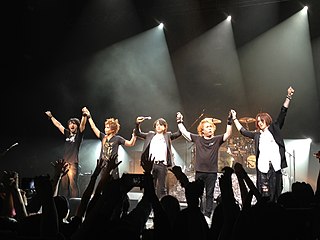
Luna Sea is a Japanese rock band formed in Kanagawa Prefecture in 1986. Due to the use of makeup and costumes early in their career and their widespread popularity, they are considered one of the most successful and influential bands in the visual kei movement. Throughout the mid-1990s they used significantly less makeup, and after a one-year break in 1997, came back with a more mainstream alternative rock style and toned down their on-stage attire. They disbanded in 2000. In 2003, HMV Japan ranked Luna Sea at number 90 on their list of the 100 most important Japanese pop acts.

Crescent is the fourth full-length studio album released by Japanese solo artist Gackt on December 3, 2003. It is a concept album linked to its predecessor Moon and comes with booklets for both records. Crescent also features a duet with L'Arc-en-Ciel vocalist Hyde for "Orenji no Taiyou" with whom Gackt co-starred in the 2003 movie Moon Child.

"Pink Spider" is the ninth single by Japanese musician hide, the second to bear the hide with Spread Beaver name, released on May 13, 1998, eleven days after his death. It debuted at number 1 on the Oricon Singles Chart and was the 11th best-selling single of the year, being certified Million by the RIAJ. It was also named "Song of the Year" at the 13th Japan Gold Disc Awards.
"Tell Me" is the fourth single by Japanese musician hide, released on March 24, 1994. It reached number 4 on the Oricon Singles Chart. The B-side "Scanner " is a different version of "Scanner" from Hide Your Face, as it features vocals by Ryuichi from Luna Sea. The single was certified Gold by the RIAJ in April 1994, and Double Platinum in February 2020 for sales over 500,000.

"Rocket Dive" is the eighth single by Japanese musician hide, the first to bear the hide with Spread Beaver name, released on January 28, 1998. It reached number 4 on the Oricon Singles Chart and was the 33rd best-selling single of the year. It has been certified double platinum by the RIAJ for sales over 500,000 copies.
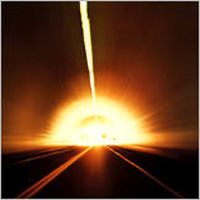
Shine is the sixth studio album by Japanese rock band Luna Sea, released on July 23, 1998. It was the band's first since switching record labels to Universal and their second consecutive number one studio album, following 1996's Style. With over 1 million copies sold, it is also their best-selling and was certified Million by the RIAJ. Shine was named "Rock Album of the Year" at the 13th Japan Gold Disc Awards.
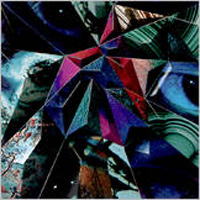
Style is the fifth studio album by Japanese rock band Luna Sea, released on April 22, 1996. It was the band's last on the record label MCA Victor, became their first number one on the Oricon Albums Chart, and charted for 21 weeks. In 1996, it was certified Platinum by the RIAJ for sales over 400,000. Luna Sea re-recorded the entire album and released it on November 29, 2023, through Avex Trax.

Next Level is the tenth studio album by Japanese recording artist Ayumi Hamasaki. It was released through Avex Trax on March 25, 2009 in five physical formats, and for digital consumption. The album was solely produced by Avex Trax owner Max Matsuura, whereas the album's content was written by Hamasaki herself. Additionally, it marks a return for several composers that helped construct her previous records, including Dai Nagao, CMJK, Kazuhiro Hara, HΛL, amongst others. Stylistically, Next Level is a departure from her previous albums, focusing on electronic music with elements of rock and dance.

"Koko de Kiss Shite." is Japanese singer Ringo Sheena's 3rd single and it was released on January 20, 1999, by Toshiba EMI, East World. It was certified gold twice by the RIAJ: Once in 1999 for 200,000 physical copies shipped, and once in 2011 for 100,000 paid downloads to cellphones.

"I for You" is the eleventh single by Japanese rock band Luna Sea, released by Universal on July 1, 1998. It reached number 2 on the Oricon Singles Chart and was the 49th best-selling single of the year. It was the third and last in a serial release after the band's hibernation from 1997 to early 1998.

"Believe" is the first single by Japanese rock band Luna Sea, released by MCA Victor as their major label debut on February 24, 1993. It reached number 11 on the Oricon Singles Chart, and sold over 200,000 copies.
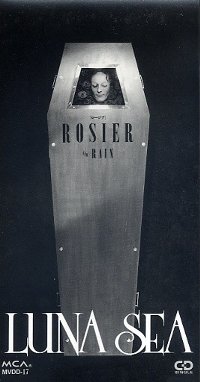
"Rosier" is the third single by Japanese rock band Luna Sea, released by MCA Victor on July 21, 1994. It reached number 3 on the Oricon Singles Chart and was certified Platinum by the RIAJ for sales over 400,000. The song's music video won Best Music Video at the 36th Japan Record Awards.
"True Blue" is the fourth single by Japanese rock band Luna Sea, released by MCA Victor on September 21, 1994. It became the band's first number 1 single on the Oricon Singles Chart, and was certified Platinum by the RIAJ for sales over 400,000.
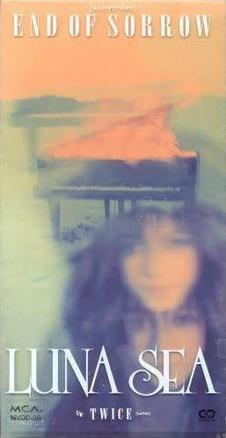
"End of Sorrow" is the seventh single by Japanese rock band Luna Sea, released by MCA Victor on March 25, 1996. It became the band's third number 1 single on the Oricon Singles Chart, and was certified Platinum by the RIAJ for sales over 400,000. This single version of the title track is slightly different from the one that appears on the album, Style.
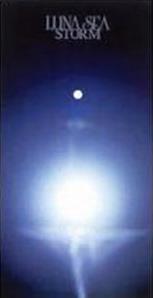
"Storm" is the ninth single by Japanese rock band Luna Sea, released by Universal on April 15, 1998. Their first release after switching record labels from MCA Victor, "Storm" became the band's fourth number 1 single on the Oricon Singles Chart. It was certified Platinum by the RIAJ and was the 29th best-selling single of the year with 720,370 copies sold, which makes it the band's best-selling single. It was used as the April 1998 theme song for NHK's music television show Pop Jam.
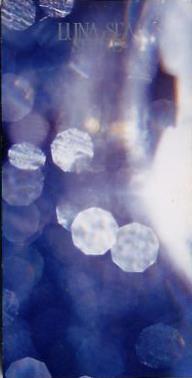
"Shine" is the tenth single by Japanese rock band Luna Sea, released by Universal on June 3, 1998. It was the band's fifth number 1 single on the Oricon Singles Chart, and was certified Platinum by the RIAJ for sales over 400,000.
"Gravity" is the twelfth single by Japanese rock band Luna Sea, released by Universal on March 29, 2000. It was the band's sixth number one on the Oricon Singles Chart, and was certified Gold by the RIAJ for sales over 200,000. The single was released in Taiwan on April 7, 2000.

"White" is the fifteenth single by Japanese boy band KAT-TUN. The track "White" is used in the "Sofina Otona no Bihaku" TV commercial, while "Perfect" is used in Kazuya Kamenashi's Aoki "3D Slim Suits" TV commercial.
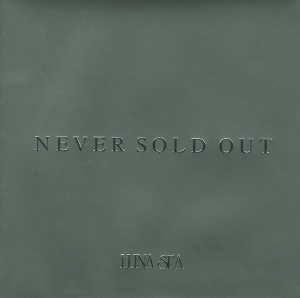
Never Sold Out is a live double album by Japanese rock band Luna Sea, released on their 10th anniversary, May 29, 1999. It compiles live recordings spanning their career up to that point, from 1991 to 1998. The album reached number five on the Oricon Albums Chart, and charted for six weeks. In June 1999, it was certified Gold by the RIAJ for sales over 200,000.

"Sakura" is the 45th single by Japanese boy band Arashi. It was released on February 25, 2015 under their record label J Storm. "Sakura" was used as the theme song for the television drama Ouroborous, starring actors Toma Ikuta and Shun Oguri. The single was released in two editions: a first press/limited edition and a regular edition. The first press/limited edition contains the B-side "Rise and Shine" and the music video and making-of for "Sakura" while the regular edition contains two B-sides. The single sold 465,381 copies in its first week and topped the weekly Oricon Singles Chart. With over 520,000 copies sold, the single was certified Double Platinum by the Recording Industry Association of Japan (RIAJ). The single placed 11th on Oricon's 2015 yearly singles ranking.















